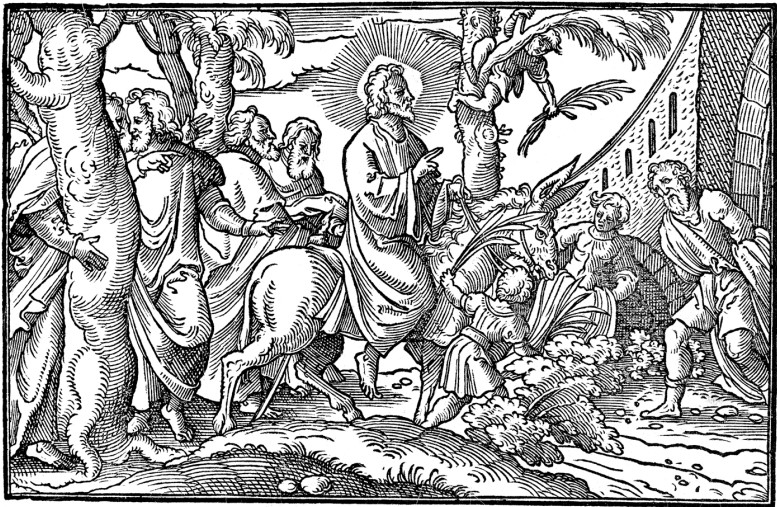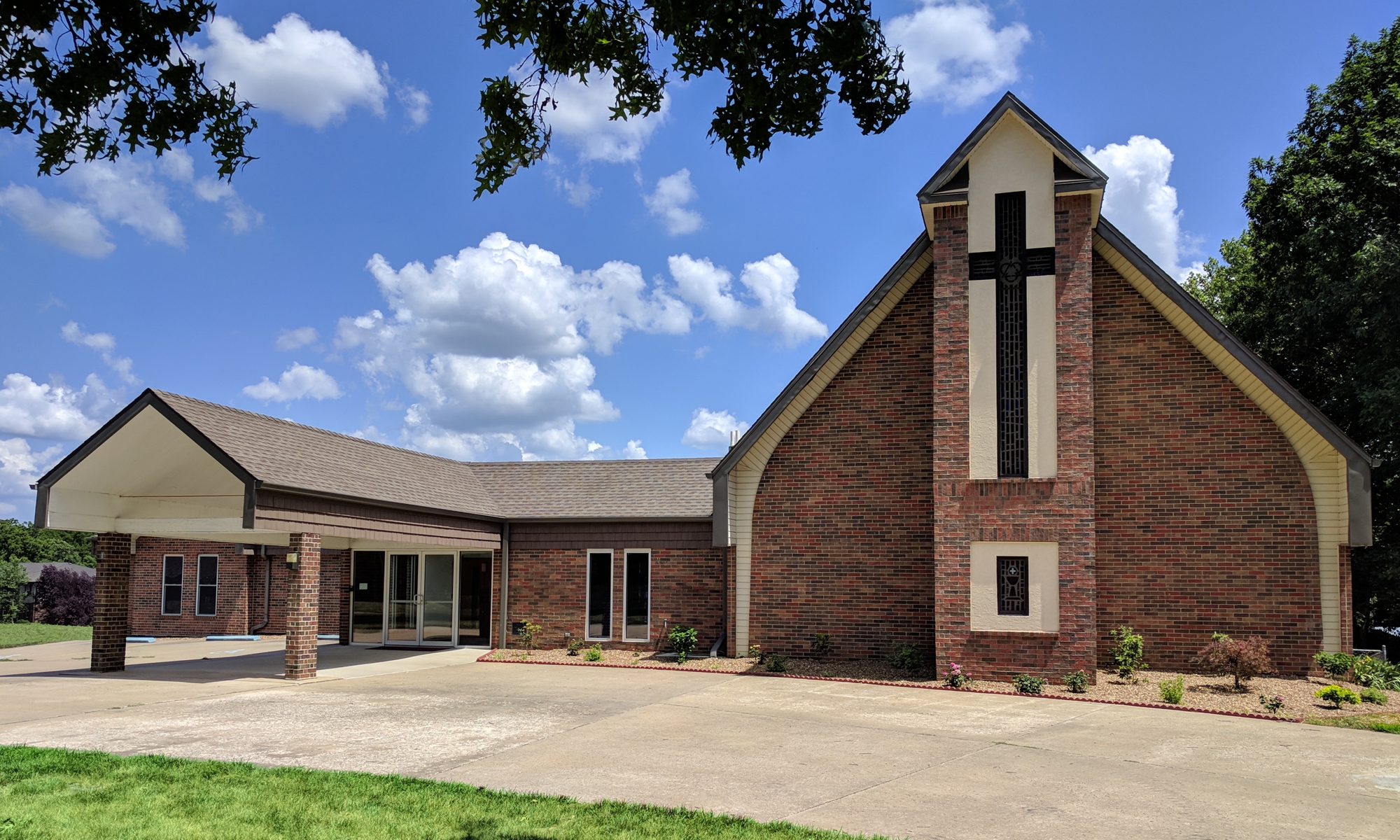
Lessons: John 12;12-19, Zechariah 9:9-12, Philippians 2:5-11, Matthew 21:1-9
Hymns: LSB 443, 442, 422, 634, 450, 441
Grace, mercy, and peace to you from God our Father and our Lord and Savior, Jesus Christ. Amen.
Today’s service takes us away from some of the usual routines in the Divine Service. In place of the Rite of Preparation was the Procession of Palms. And we got to hear our Lord’s triumphal entry into Jerusalem twice! What an excellent way to begin our week—hearing two Gospel readings! After all, as Christians, we love to soak up the Word of God, and we are joyous to hear our Lord make His entrance among His people!
There was much excitement when the crowds went with our Lord into the Holy City. People put their cloaks on the road and used palm branches to greet our Lord Jesus as He entered Jerusalem.
But why so much joy? This crowd loved Jesus and were amazed at His miracles. They rejoiced when Jesus raised Lazarus from the dead. They knew Jesus as their King. And so, they sang their hosannas to their King.
The crowds, however, didn’t quite understand how He would reign as their King or how He would save them. They will learn quickly, for in just five days, Jesus will be glorified.
This glorification is unexpected. It doesn’t appear to be great or mighty. Jesus is glorified in what He did to save sinners in love on the cross. To many, it is a jarring surprise. In a sense, we get that same jarring surprise when we sing our closing hymn. We love the hymn. If you’re like me, you will find yourself whistling it throughout the rest of the day. Yet, we will sing: “Ride on, ride on, in majesty! In lowly pomp ride on to die” (LSB 441).
Whoa! Should such a joyous-sounding hymn say these words? “Ride on to die!?”
Yes, we should sing these words in joy. The Bible declares, “Looking to Jesus, the founder and perfecter of our faith, who for the joy that was set before him endured the cross, despising the shame, and is seated at the right hand of the throne of God” (Heb 12:2).
The crowds on that first Palm Sunday sang with joy because they knew Jesus had come to save them. Perhaps they didn’t know exactly how, but they acknowledged Him as their Savior.
You see, as our Lord Jesus rode into Jerusalem, the crowds—the people—the children shouted “Hosanna to the Son of David. Blessed is He who comes in the name of the Lord. Hosanna in the highest!” (Matt 21:9). They acknowledged that this Man Jesus is indeed the Promised One from the house of David. They proclaimed Him to be the Savior as they shouted out Hosanna.
It’s interesting to note that Jesus’ name means “Savior.” And Hosanna means “Save Us.”
Jesus rides into Jerusalem to do what is necessary to save mankind from their sin. He rides in to Jerusalem to shed His Blood on our behalf, to die in the place of sinners, and to give His life as a ransom for many.
And so, Jesus rides, bearing our sins in His body—ready to atone for our sins—ready to shed His Blood in our place.
It was necessary for Jesus to do this. Without His ransom payment, we would all be on a path to Hell with no recourse. The sins we commit demonstrate the sin we inherited—the corruption of our flesh—the evil that we received.
You see, we cannot say that we are sinners because we sin. Instead, it is the other way around. We sin because we are sinners. If we were sinners only because we sin, we could turn off our sin and sinfulness like we turn off the water faucet. But because we cannot stop sinning, we must confess that we sin because we are sinners.
We are sinners because we were born in the image and likeness of sinful Adam. Through one man, sin entered the world and with sin came death. Likewise, through our Lord’s righteous act the free gift of forgiveness has come to all men, resulting in justification of life (Romans 5:12-17).
And that’s why Jesus rode into Jerusalem. To die for our sin. To make the payment as the innocent Lamb in our place. We have no innocence, so we cannot render the payment required to atone for our sin. But the payment of His innocent Blood means that Jesus could justify us—forgive us—grant us everlasting life.
Without this forgiveness, there would no life and no salvation. But with the forgiveness of sins, there is eternal life and salvation.
The Bible declares that you were once dead in your sins and trespasses (Eph. 2:1). Lazarus was once dead, too. When he laid in the grave for four days, it was obvious that he could not raise himself up from the dead. But when Jesus went to the tomb of Lazarus and shouted, “Lazarus, come forth,” Lazarus rose immediately from the dead (John 11:38-44).
Who did this grand work? Jesus did. That is to say, God did. Lazarus had no say and could take no credit for his resurrection. He had been dead. But when Jesus spoke, Lazarus arose. The entire work was done by God.
Because we are all sinners, we were once spiritually dead—in fact, as dead as Lazarus. We could not help ourselves. We could not make ourselves alive in Christ. We could not cause ourselves to stand in God’s grace. We could not make ourselves righteous. We could not bring about our faith. We could not reconcile ourselves to God.
So, what could we do to save ourselves? Nothing. Nothing at all.
But the Holy Spirit came to us through the Word of God. He worked faith in us. The same Word that caused Lazarus to arise from his slumber is the Word that causes us to arise from spiritual death.
Jesus has made us alive in Him. We could not do it. We were dead. But He has brought us forth—He has given us a new heart and new spirit—He has worked salvation in us.
The very Man who raised Lazarus from the dead also raises us.
The very Man who raised Lazarus from the dead now rides into Jerusalem so that He himself could die. The Lord of Life rides on to die. He goes to make satisfaction for our sin.
When Jesus raised Lazarus from the dead not long before His triumphal entry, many believed in Christ. In this, Jesus is glorified.
But now the glory of Jesus is being hidden. You see nothing but humility as Jesus rides into Jerusalem. He’s not on a horse or another great animal. Instead, Jesus is on a colt, the foal of a donkey. He is riding into Jerusalem on a beast of burden—on an animal that used for work.
His glory is veiled, and the disciples did not understand what was taking place (John 12:16). It made little sense to them that there should be crowds waving palm branches and laying down their cloaks before Jesus as He rode into Jerusalem. They didn’t understand what the fuss was all about.
But many who witnessed the resurrection of Lazarus were proclaiming their hosannas. They were lifting up their shouts of joy. They were celebrating the arrival of their King.
Yet, veiled in all this is the fact that Jesus must go to the cross. He would be rejected by the same city as those who joyfully received Him. We would be mocked and insulted and spit upon. He would be nailed to a cross, being forsaken by His heavenly Father—all because He gladly bore our sins in His body, loves us, and made the ultimate sacrifice for us.
In this crucifixion of our Lord, He is indeed glorified. He appears as a lowly Man as He was bleeding and dying on the cross. People continued to jeer at Him, hurling out insults as He hung on the cross, yet His glory is made manifest on the cross.
For it is at that cross that He lovingly and joyfully takes away the sin of the world. He takes away your sin, mine, all sin. He sheds His blood for our forgiveness. He atones for all that we have done amiss. He saves us.
On the cross, justice is met, God’s love for you is shown most clearly, and Jesus was reconciling the world to Himself.
We now receive that forgiveness through His Word and Sacraments. The Holy Spirit delivers to us what Jesus has earned for us on the cross. Veiled in the water and the Word is Jesus’ gift of Baptism, by which He rescues you from death and the devil and gives you eternal salvation. Veiled in the bread and wine is the Body and Blood of Jesus poured out for your forgiveness. Veiled in the words of the Absolution is the very voice of God declaring you to be innocent.
The power of God is at work in these means. There’s no question about it. God is indeed present and is indeed at work. God reveals His glory in the things that appear ever so weak.
And through these means of grace, He really does declare you to be one of His dearly beloved children—innocent and righteous in Him. He does not hide His face from you, but comes to you as your Savior. He is not hidden from you, but has made you His child and has prepared a heavenly home for you.
Jesus died to take your sin away. He rose to give you life. Jesus reigns to be your glorious Lord and King—the Lamb of God who takes away the sin of the world. Jesus’ judgment for all repentant and faithful Christians will be to declare them innocent.
Thanks be to Him who gives us the victory! Hosanna to the Son of David. Hosanna in the highest! Amen.
The peace of God which passes all understanding keep your hearts and minds in Christ Jesus to life everlasting. Amen

